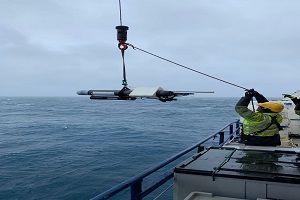Neelam Rahim | neelam@radioislam.co.za
3-minute read
06 May 2023 | 14:32 CAT

Photo Credit: CSIR
The Council for Scientific and Industrial Research (CSIR) took to the stage at the TEDx Johannesburg event on climate change to share the outcomes of a ground-breaking study that reveals the declining productivity levels of the Southern Ocean. CSIR senior researcher, Dr Thomas Ryan-Keogh, unpacked the implications of high iron stress levels on phytoplankton (microscopic marine plants) in the Southern Ocean and how this will impact the overall health of the global ocean and the future of our planet.
In an interview with Radio Islam International, Dr Ryan-Keogh shed light on the research and its importance.
Giving insight on the career as an oceanographer – someone who studies life in the ocean, Dr Ryan-Keogh said it is an exciting lifestyle which allows him to visit Antarctica almost every other year.
“I get to see wonderful marine life such as whales, penguins, seals and giant floating icebergs in the ocean,” he says.
Dr Ryan-Keogh highlighted public concerns that should surround how climate change impacts the Southern Ocean.
“The Southern Ocean has managed to protect all of us from some of the most extreme impacts of climate change by absorbing carbon dioxide emissions and the heat generated by these emissions through the greenhouse effect. But this protection comes at a cost to the natural ecosystems of Antarctica and the Southern Ocean,” says Ryan-Keogh.
He explained that 26 years of data revealed that the phytoplankton in the Southern Ocean was becoming more iron-stressed with time.
His latest research findings indicate that an escalation in iron stress is detrimental to the Southern Ocean’s phytoplankton. This implies a decrease in iron availability in the sunlit waters, directly impacting the capacity of Southern Ocean phytoplankton to absorb carbon dioxide. This, in turn, affects the ocean’s productivity levels and ability to maintain ecosystem services.
Listen to the full interview on Your World Today with host Mufti Yusuf Moosagie.







0 Comments